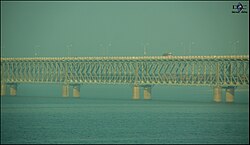Rajamahendravaram
| Rajahmundry | |
|---|---|
| City | |
| Rajamahendravaram | |

A train moving inside Rail cum Road Bridge
|
|
| Nickname(s): Cultural Capital of Andhra Pradesh | |
| Location of Rajahmundry in Andhra Pradesh | |
| Coordinates: 16°59′N 81°47′E / 16.98°N 81.78°ECoordinates: 16°59′N 81°47′E / 16.98°N 81.78°E | |
| Country | India |
| State | Andhra Pradesh |
| Region | Coastal Andhra |
| District | East Godavari |
| Founded by | Rajaraja Narendra (king 1022 AD) |
| Government | |
| • Body | Rajahmundry Municipal Corporation |
| Area | |
| • City | 162.83 km2 (62.87 sq mi) |
| Area rank | 4 |
| Elevation | 14 m (46 ft) |
| Population (2011) | |
| • City | 341,831 |
| • Rank |
108th (India) 6th (Andhra Pradesh) |
| • Metro | 476,873 |
| Languages | |
| • Official | Telugu |
| Time zone | IST (UTC+5:30) |
| PIN | 533 101 |
| Telephone code | +91-883-XXX XXXX |
| Vehicle registration | AP-05 |
| Website | rajahmundry |
Rajahmundry (officially: Rajamahendravaram) is one of the major cities in the Indian state of Andhra Pradesh. It is located on the banks of the Godavari River, in East Godavari district of the state. The city is the mandal headquarters to both Rajahmundry (rural) and Rajahmundry (urban) mandals.
It is also the divisional headquarters of Rajahmundry revenue division and one of the two municipal corporations in the district, alongside Kakinada and the biggest city in both the godavari districts waiting for a greater status. As of 2011[update]census, it is the sixth most populous city in the state, with a population of 341,831.
The city is most notable for its historic agricultural, economic and cultural backgrounds. Hence, the city is also known as the Cultural Capital of Andhra Pradesh or "The Grand city of Culture". One of the longest road cum rail bridges is on the Godavari River, connecting Kovvur and Rajahmundry. The Kotilingeswar Ghat temple on the banks of Godavari river is one of fifty five Shakti Peethas.
In its earlier days, it was called Rajamahendravaram. But later, it was referred as Rajahmundry. On 10 October 2015, the government made the official announcement to rename the city with its original name, Rajamahendravaram.
The city can be traced back to the rule of the Eastern Chalukya king Raja Raja Narendra who reigned around 1022 AD, after whom it is named – Rajamahendri or Rajamahendravaram. Remains of 11th century palaces and forts still exist. However, new archaeological evidence suggests that the town may have existed much before the Chalukyas.
...
Wikipedia

